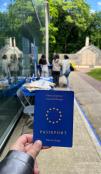“Sport For All”: European Union and Council of Europe Champion Inclusion and Ability Over Disability

Held in Strasbourg, the launch event brought together representatives from 41 Council of Europe Member States of the Council of Europe’s Enlarged Partial Agreement on Sport (EPAS), representatives of the European Commission, and 30 sports organisations. Speakers highlighted the need to break down barriers—both physical and societal—that hinder persons with disabilities from full participation in sport.
Gianluca Esposito, Director General of Human Rights and Rule of Law at the Council of Europe, opened the event by calling for a mindset shift: “Inclusion through sport is about recognising ability over disability. It is about creating a world where everyone can play, everyone can compete, and everyone can belong.”
Normunds Popens, Deputy Director-General at the European Commission’s Directorate-General for Education, Youth, Sport and Culture, attended the event online and voiced strong support for this joint project. To this regard, he announced the upcoming launch of the European Commission’s communication plan later this year. He also emphasised sport’s contribution across many EU policy areas, highlighting the role of Erasmus+ in encouraging participation in sport, physical activity, and voluntary work, while addressing broader social and sport-related challenges. Alexandre Husting, Chair of the EPAS Governing Board, welcomed such Erasmus+ actions in the field of sports and praised the European Commission’s European Week of Sport, as key steps towards building a more active and engaged society.
Pia Haschke, Policy Officer at the European Commission’s Sport Policy and Programme Unit, attended the launch event in person and reaffirmed that sport remains central to the European Commission’s mission, backed by dedicated funding and targeted initiatives. Speaking on the importance of visibility, particularly in inclusion-focused efforts, she emphasised the Commission’s active role in supporting education on key societal issues linked to sport. Highlighting the value of hands-on engagement—whether by listening, learning, or even taking part in inclusive sport activities—Ms Haschke concluded with a powerful reminder of the broader vision behind these efforts: a strong, united Europe built on cooperation, democracy, and human rights.
Moreover, high-level Paralympic athletes—including Zakia Khudadadi, Arnaud Assoumani, Gizem Girişmen and Yaroslav Denysenko—shared powerful testimonies on sport’s transformative power. Speaking for marginalised groups, Khudadadi, the first medalist of the Refugee Paralympic Team, underlined: “Sport can be a powerful driver of dignity, equality, and hope.” They also discussed their own involvement, as well as that of other athletes, in shaping sports policies and explored ways to strengthen this engagement.
The event was also preceded by a blind football training session on the Council of Europe lawn, offering participants a hands-on experience of inclusive sport in action.
The Sport For All joint project will be implemented from March 2025 until August 2026. Co-funded by the European Union, it addresses discrimination and limited access to sports faced by persons with physical, sensory, intellectual, and psychosocial disabilities. The project builds on ongoing efforts to create a more inclusive sports culture by tackling the social and systemic obstacles that continue to prevent persons with disabilities from participating fully in sport. In addition to physical barriers, many also face online discrimination, including hate speech and cyberbullying, which further discourages their involvement. In this context, the project aims to strengthen access to anti-discrimination tools and practices within sports organisations and foster safer, more welcoming environments. The project focuses on three interconnected areas: building the capacity of sport professionals through country-specific assessments, tailored workshops, and the development of educational materials; promoting the exchange of best practices via hybrid webinars and public resources; and raising awareness through a series of short video clips featuring athletes with disabilities from across Europe. These personal stories will help challenge stereotypes, promote positive narratives, and support the broader objective of making sport a truly inclusive space.
This initiative as well as its launch event represented a true reflection of the European Union and Council of Europe’s long-standing partnership to advance equality, dignity, and inclusion across the continent.





